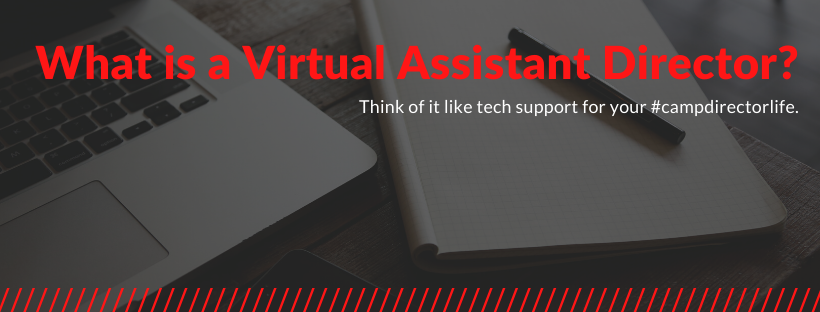For a few years now I’ve been encouraging camps, especially smaller camp teams, to consider using a Virtual Assistant to manage some of the day-to-day tasks both during the program season and off-season.
A quick Google Search on Virtual Assistants shows not only some of the best tasks to outsource to them but also how to recruit and hire one (or two or three or four).
While some tasks at camp can totally be done by anybody with a computer and internet (which we are all learning right now during our shelter-in-place orders), some tasks at camp you may be hesitant to pass off to someone who doesn’t “get camp.”
Need to sort through your camper schedules and resolve all the issues that your software’s autoscheduler created? Need to create yet another spreadsheet? Want to comb through your camper data from the last few years and get a great handle on your retention trends? Need to pester folks about the paperwork that needs to be turned in by all campers and staff. Want someone to tag all those photos you take every day? These are all excellent tasks for a Virtual Assistant.
But what about those tasks that require a Director’s eye or ears?
The feedback gathering from staff that you never can seem to find enough time for.
The online training that you want to lead with members of your leadership team.
That parent, you know the parent, that calls every.single.day, just to talk.
The staff member, you know the staff member, that knocks on your door every.single.day, just to talk.
How much of your stress would be eliminated by having the expertise of another Camp Director available to you for a few hours each week without adding another full-time salary?
This summer, Ruby Outdoors is offering one camp the opportunity to hire a former Camp Director and current staff trainer Ruby Compton as a Virtual Assistant Director.
In case of abundant inquiries, Ruby Outdoors works with furloughed and laid-off camp directors to match them as Virtual Assistant Directors to camps that are operating either in-person or virtual programming.
Special offering in response to COVID-19
In the midst of COVID-19, more and more programs are considering the use of remote teams to operate virtual camp—and the influx of digital tools to oversee those spaces, Camp Directors are increasingly being asked to not only run camp but also master an entirely new set of tools, community spaces, and gathering guidelines.
Imagine if all you had to do was show up for virtual content and do what you do best—BE THE CAMP DIRECTOR. Imagine not having to worry about knowing which buttons to push and how to resolve each person’s tech issues. Imagine being able to focus on what you know how to do best: building community and making memories for your campers.
A Virtual Assistant Director can make those dreams a reality.
Remember that with online spaces comes virtual personnel management as well and if you aren’t excited about keeping your staff’s Slack, Google Drive, WhatsApp up-to-date and managing through your keyboard, that your Virtual Assistant Director can integrate into the systems that currently work for you and help provide the day-to-day management of your team and your virtual workspace.
Scheduling calls & virtual events
Managing registrations for online gatherings
Tech hosting gatherings to ensure videos, music, and chat boxes run smoothly
Posting announcements to remote staff
Conducting regular check-ins with remote staff
Scheduling meetings
Recording video updates for staff
Editing videos, audio, and podcasts
It’s like on-call tech support for your position as a camp director.
And what if you have a staff member who would be an awesome Virtual Assistant Director—one of your own people! That’s fantastic! Ruby Outdoors is offering a four-hour training program for best practices for Virtual Assistant Managers. You can get a taste of the material with this FREE email course.
Interested in having Ruby train your Virtual Assistant Directors? Email her here to discuss your needs.









